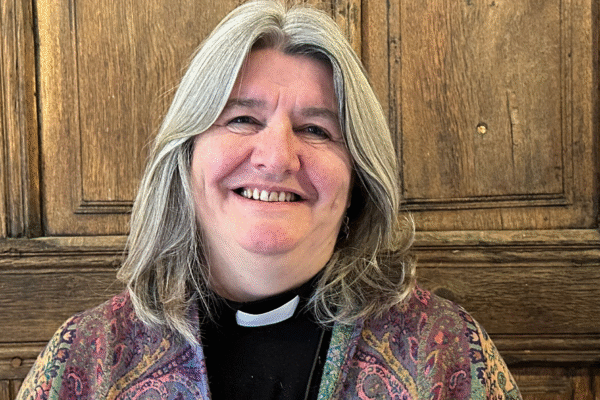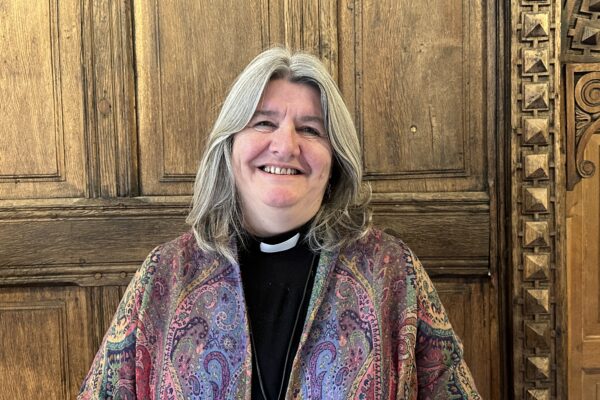As I sat quietly in the side chapel having a few prayerful moments between services that Easter morning, a rather obnoxious smell overwhelmed me. It took me a few moments to realise that the smell was coming from me! Then I remembered the egg I had been given by a family as they left the early morning worship. A beautiful painted egg, hard boiled, which I had slipped into my pocket and then forgotten. I had sat on it and the pungent aroma was now filling the place!
That first Easter morning, some of the women went hurrying back to the grave of their friend Jesus to anoint his body. Like all good Jews they had adhered to the restrictions of the Sabbath but at the earliest opportunity here they are, concerned that in the heat and the gore of death, his body would begin to smell rotten. It needed to be wrapped in spices.
We know from Luke’s telling of the story of Jesus that these women had been faithful companions along the way. Funding his ministry and following in his footsteps. It was women who had remained when the disciples fled after Jesus’ betrayal, standing at the foot of the cross. It was these women who we are told in the previous chapter watched where Joseph of Arimathea had buried the body.
So, they knew where they were going. There was no mistake. Despite their sorrow and fear, they were determined to fulfil this last task of love and commitment for Jesus. Mary Magdalene had been the one who had anointed his feet with her tears and dried them with her hair, as we are told earlier in the gospel. She would have known how such an act of intimacy was viewed, but in death how else did the women show their honour and care for someone who had treated them with such respect?
These women understand their limitations. Who will remove the obstacle in their way? The stone which had been placed over the cave entrance? The other gospels speak of the sealing of the tomb, a guard being placed upon it. There was already concern expressed that Jesus’ disciples would try to take the body perhaps to suggest he had never really died. As they walked to the garden graveside they would have been wondering what they might find but could any of them have anticipated the unexpected?
Luke is the gospel writer who challenges the cultural prejudice of his day. He would have understood that the testimony of women did not have the same equivalence as that of men in a court of law and yet here we find the resurrection is witnessed firstly by women. These women have been there throughout the ministry of Christ, have stood by when others have fled, and have been faithful.
As they stumble into the open tomb, they find the body gone and angels telling them of what has happened and instructing them to go and tell others. What would you do?
Sisters and brothers, I want to invite those of you who have heard the good news of Jesus, who have already become followers of him, to be angels too. To be like those women who went to tell others about what they had seen. That is what an angel is. A messenger. Someone who witnesses to what God has done, and speaks of his love for the world.
These women overcame their terror, their doubt, and hurried back to share the news with the disciples. Having met angels, these witnessing women become angels.
But being an angel is not an easy task. They are not believed. Their words are dismissed as nonsense. They are merely women, prone to idle tales. Nevertheless, Peter goes to check, and finds the truth. Having been amazed that the women could make such claims, now he is amazed by what he discovers for himself.
These women, these disciples, are eyewitnesses, recipients of revelation, the first evangelists. In telling the story they become part of the story. Their lives are changed. Their world is turned upside down. And as more and more people hear the story, so the Church comes into being.
Friends, I want to invite those of you, who doubt the veracity of the resurrection of Jesus to be like Peter and go and have a look for yourselves. We may not have the opportunity of a first-hand peer inside the open tomb but there is evidence to be found in the changed lives of those around us. What is it that can turn fear into faith? Despair into hope?
As we look at the world today, it would be so easy to be deeply despondent. Wars escalate, injustice thrives, greed divides us. The way we treat one another, our lack
of respect for the world in which we live, our preoccupation with self requires us to change.
As I reflected on the change that we need to make, I was struck by these words of Fatima Hassouna, a young woman of 25, who was killed in Gaza this month, just days before her wedding.
“If I die, I want a loud death, I don’t want to be just breaking news, or a number in a group, I want a death that the world will hear, an impact that will remain through time, and a timeless image that cannot be buried by time or place.”
We all want our lives to make a difference in the world around us. To know that our presence in this life had an impact. Not many of us will make the headlines like Fatima.
Today, on this Easter Sunday we remember one whose death was not the end of the story but only the beginning. It was not Jesus’ death itself which sounded ‘loud’ but rather the reverberating echo of his resurrected life. You and I now have the task to go and be angels, living and telling the story to others.


